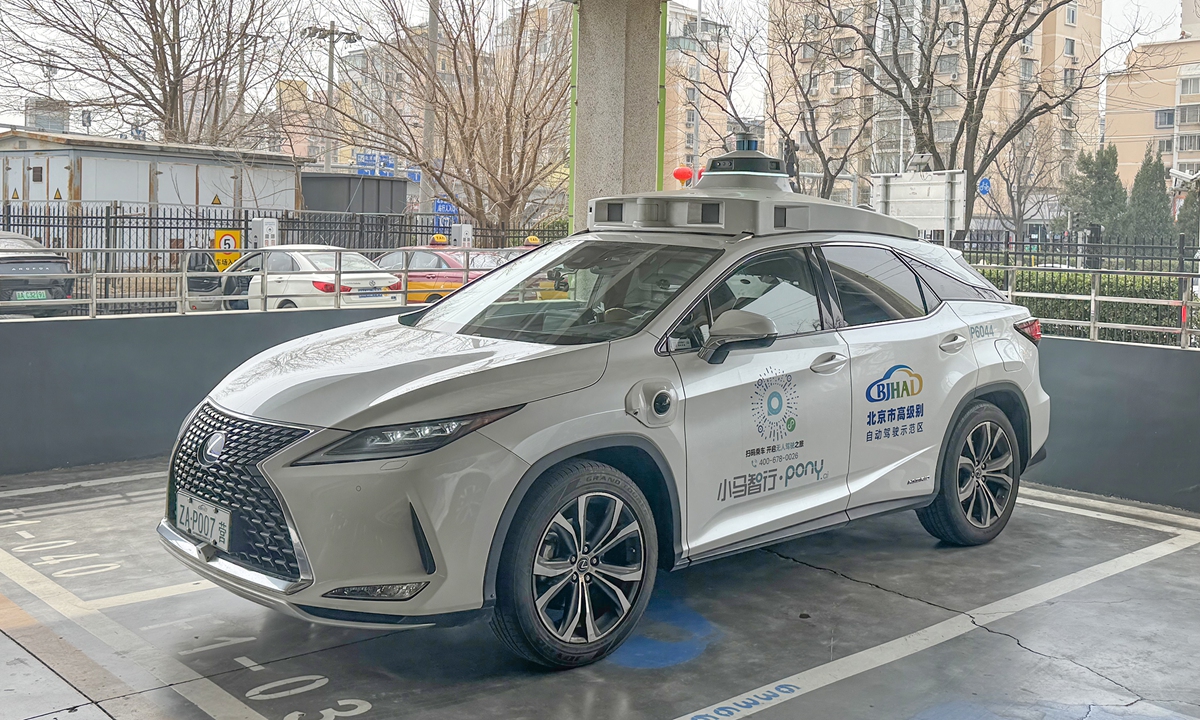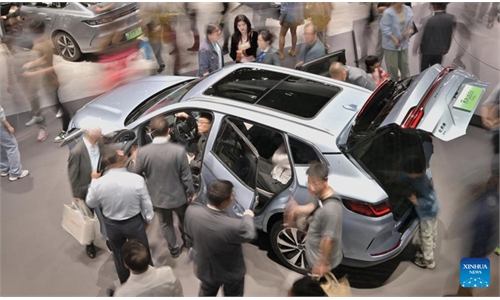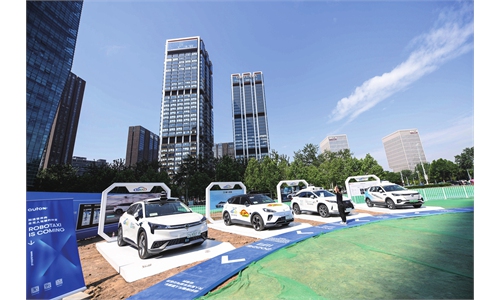Beijing launches robotaxi service at railway station, showing China’s rapid development in autonomous driving

A robotaxi waits in a parking lot in Beijing South Railway Station in urban Beijing on March 13, 2025. Photo: Chen Qingrui/GT
China's autonomous driving start-up Pony.ai has officially launched its Robotaxi service connecting the Beijing South Railway Station with the Beijing Economic-Technological Development Area (BDA), according to the company on Thursday.
This marks the first time that commercial autonomous driving ride-hailing services have been made available at a train station in urban Beijing, according to the China Securities Journal on Thursday.
The move also serves as a vivid display of the rapid development of China's autonomous driving sector, indicating the current technology can safely support vehicle operations in complex environments in major cities like Beijing, an industry analyst said.
On Thursday, a Global Times reporter booked a ride from Beijing South Railway Station to the BDA. Despite heavy traffic, the ride was remarkably smooth, consistently maintaining a safe distance from other vehicles while executing seamless lane changes and overtaking with precision. Under stable road conditions, the robotaxi kept a steady speed with minimal fluctuations. It maintained seamless acceleration and braking, ensuring a smooth and comfortable ride.
A robotaxi safety operator told the Global Times on Thursday that the heavy traffic and high pedestrian flow around the Beijing South Railway Station provide a critical real-world test for autonomous driving capabilities. He expressed confidence in the system's ability to navigate these challenges effectively.
Due to the complex parking environment at the railway station, each vehicle will be accompanied by a safety operator during parking in future operations, the operator said.
The robotaxi service in Beijing is just the latest example of robotaxi services being launched in several major Chinese cities. Previously, the launch of robotaxi services in some cities drew nationwide attention.
Wuhan, in Central China's Hubei Province, became the first in the central region to achieve full-scale commercial operations of fully autonomous driving in its central urban areas, the Wuhan Economic and Technological Development Zone said in a post on Monday. The city has established 28 pilot scenarios for autonomous functional vehicles.
In South China's Guangdong Province, since the launch of its autonomous driving mixed-traffic pilot program in 2021, the province has opened 2,500 km of test roads and established a 3,240-square-km demonstration zone, the largest in China, the Guangzhou Daily reported last week.
Since February, passengers in downtown Guangzhou have been able to hail autonomous vehicles (robotaxis), marking a milestone in the commercialization of autonomous driving, the Guangzhou Daily report said.
In January, Shanghai launched its first fleet of 30 autonomous driving data collection vehicles for large-model training. The initiative gathers real-time data citywide, including vehicle-generated training data, traffic signal information and road conditions, to enhance autonomous driving capabilities, according to the Shanghai State-owned Assets Supervision and Administration Commission in January.
China's autonomous driving industry has a well-established framework, with core technologies and most components independently developed, positioning it as a global leader, Wu Shuocheng, a veteran automobile industry analyst, told the Global Times on Thursday, noting the launch of the robotaxi service in Beijing as a highlight of China's rapid development in the autonomous driving.
Wu anticipated that over the next one to two years, artificial intelligence and other emerging technologies will further propel significant improvements in autonomous driving, paving the way for major breakthroughs in the commercialization of specific application scenarios.
"While autonomous vehicles are technically capable of operating in complex conditions currently, further rigorous validation is essential to ensure overall traffic efficiency and safety," he added.
China's autonomous vehicle industry has been expanding rapidly in recent years and still holds massive potential. Autonomous ride-hailing vehicles expected to account for more than half of the shared mobility market, with the market size expected to exceed 1.3 trillion yuan ($179.36 billion) by 2030, according to a Xinhua report on Wednesday.
Moreover, global consulting firm McKinsey & Co has predicted that China will become the world's largest market for self-driving vehicles, with revenue from such vehicles and mobility services exceeding $500 billion by 2030, Xinhua reported.



